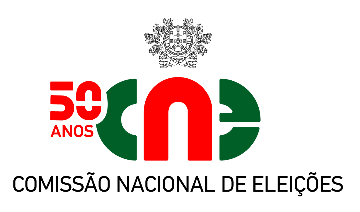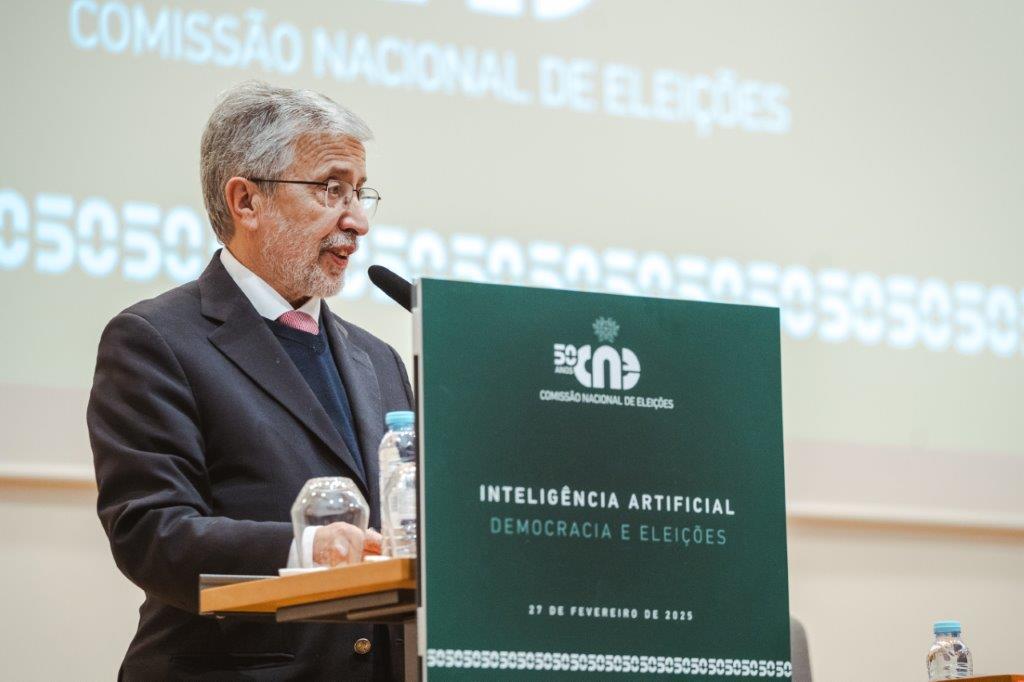|

Conferência sobre Inteligência Artificial, Democracia e Eleições

No passado dia 27 de fevereiro, a Comissão Nacional de
Eleições de Portugal assinalou os 50 anos sobre a tomada de posse da I Comissão
com a realização da conferência “Inteligência Artificial, Democracia e
Eleições”, em Lisboa.
Numa época em que se colocam inúmeros desafios aos órgãos
de administração eleitoral e ao sistema democrático, nada mais apropriado do
que assinalar esta data com um debate e uma reflexão aprofundada sobre um tema
incontornável na atualidade: a utilização da Inteligência Artificial, o seu
impacto na democracia e a sua influência nos processos eleitorais.
A conferência contou com o Alto Patrocínio de Sua
Excelência o Presidente da República, tendo-se iniciado com uma mensagem em
vídeo do próprio.
O evento foi estruturado em dois painéis temáticos:
“Inteligência Artificial e Eleições” e “Democracia e Inteligência Artificial”,
nos quais participaram 11 oradores de diversas áreas do saber.
I Painel: Inteligência Artificial e Eleições
O primeiro painel moderado por Fernando Anastácio, membro
da Comissão Nacional de Eleições, teve início com a intervenção do Professor
Carlos Fiolhais (Faculdade de Ciências e Tecnologia da Universidade de
Coimbra), intitulada “A Inteligência Artificial num Mundo em Mudança”.
Seguiu-se a Professora Sofia Casimiro (Faculdade de
Direito da Universidade de Lisboa), que abordou a “Regulamentação da
Inteligência Artificial”.
A Diretora da Agência Lusa, Luísa Meireles, desenvolveu a
temática “Media, Comunicação Social e Eleições”.
Posteriormente, Srdjan Darmanovic, membro da Comissão de
Veneza e Vice-Presidente do Conselho para as Eleições Democráticas, apresentou
“O Trabalho da Comissão de Veneza sobre Tecnologias Digitais e Inteligência
Artificial nos Processos Eleitorais”.
A temática “Eleições e Tecnologia” foi explorada por
Joaquim Morgado, Secretário-Geral Adjunto do Ministério da Administração
Interna.
Por fim, João Almeida, membro da Comissão Nacional de
Eleições, abordou o tema “Administração Eleitoral”.
As conclusões ficaram a cargo de Frederico Valente Nunes,
igualmente membro da CNE, que destacou os
desafios e oportunidades que a Inteligência Artificial (IA) apresenta para a
democracia, questionando sua dualidade entre promover a verdade ou a
desinformação, e a necessidade de regulamentação. Foi igualmente referido que
os algoritmos, embora sejam apenas códigos, podem alterar as dinâmicas de
filtragem de informação na sociedade, influenciando inconscientemente os
cidadãos. No entanto, reconhece-se que a IA também pode ser uma ferramenta
valiosa para identificar desinformação e aprimorar processos democráticos, como
a análise de financiamentos partidários.
II Painel: Democracia e Inteligência Artificial
O segundo painel, moderado por Fernando Silva, membro da
Comissão Nacional de Eleições, teve início com a intervenção de Gonçalo de
Almeida Ribeiro, Vice-Presidente do Tribunal Constitucional, que refletiu sobre
“Inteligência Artificial e a Constituição da República Portuguesa”.
Seguiu-se a apresentação da Professora Susana Aires de
Sousa (Faculdade de Direito da Universidade de Coimbra) sobre “Crimes
Eleitorais e Inteligência Artificial: Alguns Desafios”.
O Juiz Conselheiro do Supremo Tribunal de Justiça, Jorge
Bravo, abordou a questão da “Desinformação Política e Liberdade de Expressão”.
De seguida, o advogado e colunista Francisco Teixeira da
Mota analisou o tema “Jornalismo e Cidadania em Tempos de Inteligência
Artificial”.
Ainda no âmbito da informação, Gustavo Cardoso, Professor
do Instituto Superior de Ciências do Trabalho e da Empresa e especialista em
Comunicação e Desinformação, apresentou a temática “Eleições e Manipulação de
Informação”.
As conclusões deste painel foram asseguradas por Teresa
Leal Coelho, membro da Comissão Nacional de Eleições, que destacou o potencial
da Inteligência Artificial para impulsionar o progresso, especialmente em áreas
como direitos fundamentais, e os riscos, como a violação de privacidade e
manipulação de informação. Em contextos políticos, a IA pode trazer benefícios
para os processos eleitorais, mas também pode ser usada para disseminar
desinformação. A maior preocupação, no entanto, é a natureza humana por trás do
uso da tecnologia, que muitas vezes contribui para a propagação de conteúdos
falsos, afetando a credibilidade e a segurança das informações.
Todas as intervenções contribuíram significativamente para
enriquecer o debate, acrescentando valor e interesse ao evento.
A Conferência sobre Inteligência Artificial, Eleições e
Democracia está disponível no canal de YouTube da Comissão Nacional de
Eleições, podendo ser visualizada através da seguinte ligação: https://youtu.be/7_h7TXBxi6M.
Conference on Artificial Intelligence, Democracy
and Elections
On 27 February, The Portuguese National Electoral
Commission marked the 50th anniversary of the inauguration of its first
Commission with the conference "Artificial Intelligence, Democracy, and
Elections" in Lisbon.
At a time when electoral administration bodies and the
democratic system face numerous challenges, there was no better way to
commemorate this date than with a debate and in-depth reflection on an
unavoidable topic in today’s world: the use of Artificial Intelligence (AI),
its impact on democracy, and its influence on electoral processes.
The conference was held under the High Patronage of
His Excellency the President of the Republic and opened with a video message
from him.
The event was structured into two thematic panels:
"Artificial Intelligence and Elections" and "Democracy and
Artificial Intelligence", featuring 11 speakers from various fields of
expertise.
Panel I: Artificial Intelligence and Elections
The first panel, moderated by Fernando Anastácio, a
member of the National Electoral Commission, began with a presentation by
Professor Carlos Fiolhais (Faculty of Science and Technology, University of
Coimbra) entitled "Artificial Intelligence in a Changing World".
This was followed by Professor Sofia Casimiro (Faculty
of Law, University of Lisbon), who addressed the "Regulation of Artificial
Intelligence".
Luísa Meireles, Director of the Lusa News Agency,
explored the theme "Media, Social Communication, and Elections".
Subsequently, Srdjan Darmanovic, member of the Venice
Commission and Vice-President of the Council for Democratic Elections,
presented *The Work of the Venice Commission on Digital Technologies and
Artificial Intelligence in Electoral Processes".
The topic "Elections and Technology" was
explored by Joaquim Morgado, Deputy Secretary-General of the Ministry of
Internal Administration.
Finally, João Almeida, member of the National
Electoral Commission, discussed "Electoral Administration".
The panel’s conclusions were delivered by Frederico
Valente Nunes, also a member of the CNE, who highlighted the challenges and
opportunities AI presents for democracy, questioning its dual nature—whether it
promotes truth or disinformation—and emphasising the need for regulation. He
also noted that while algorithms are merely lines of code, they can reshape the
way information is filtered in society, unconsciously influencing citizens.
Nevertheless, AI can also serve as a valuable tool for identifying
disinformation and improving democratic processes, such as the analysis of
party funding.
Panel II: Democracy and Artificial Intelligence
The second panel, moderated by Fernando Silva, a
member of the National Electoral Commission, began with an address by Gonçalo
de Almeida Ribeiro, Vice-President of the Constitutional Court, who reflected
on "Artificial Intelligence and the Constitution of the Portuguese
Republic".
This was followed by Professor Susana Aires de Sousa
(Faculty of Law, University of Coimbra), who discussed "Electoral Crimes
and Artificial Intelligence: Some Challenges".
Jorge Bravo, Judge of the Supreme Court of Justice,
tackled the issue of "Political Disinformation and Freedom of
Expression".
Next, lawyer and columnist Francisco Teixeira da Mota
analysed the topic "Journalism and Citizenship in the Age of Artificial
Intelligence".
Still within the scope of information, Gustavo
Cardoso, Professor at ISCTE – University Institute of Lisbon and an expert in
Communication and Disinformation, presented on "Elections and Information
Manipulation".
The panel’s conclusions were delivered by Teresa Leal
Coelho, a member of the National Electoral Commission, who highlighted AI’s
potential to drive progress, particularly in areas such as fundamental rights,
while also noting the risks of privacy violations and information manipulation.
In political contexts, AI can enhance electoral processes but can also be
misused to spread disinformation. The greatest concern, however, lies in the
human factor behind technology, which often contributes to the dissemination of
false content, affecting the credibility and security of information.
All contributions significantly enriched the debate,
adding value and interest to the event.
The *Conference on Artificial Intelligence, Elections,
and Democracy* is available on the YouTube channel of the National Electoral
Commission and can be viewed at the following link: https://youtu.be/7_h7TXBxi6M](https://youtu.be/7_h7TXBxi6M.
* Summary of the Conference is available at the following link: https://aweb.org/eng/bbs/B0000013/view.do?nttId=16476&searchCnd=&searchWrd=&gubun=1&delcode=0&useAt=&replyAt=&menuNo=300041&sdate=&edate=&deptId=&isk=&ise=&viewType=&type=&countrySn=&pageIndex=1
|

